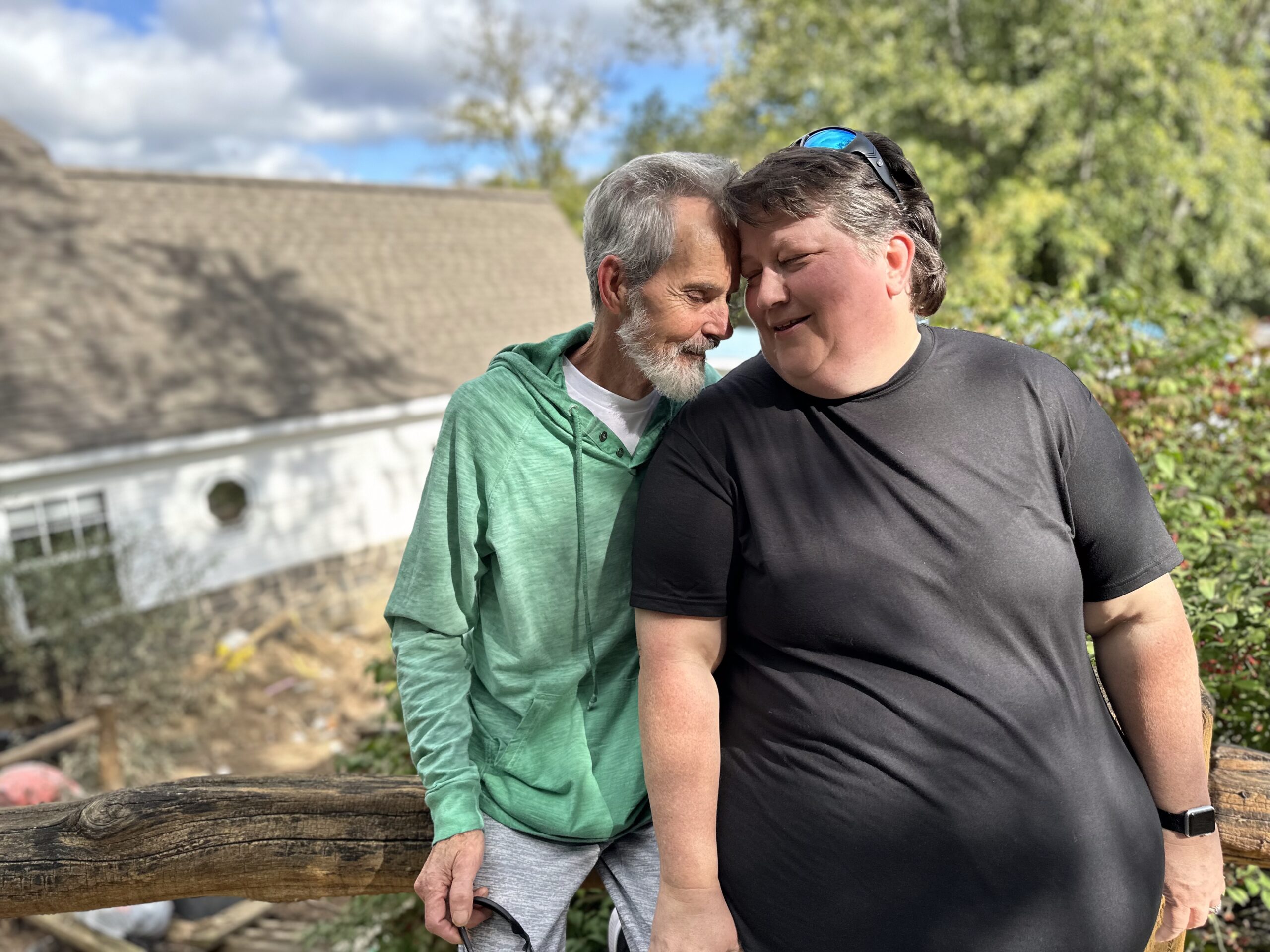Meaning
Roger Lee, 68, is a woodworker, and is deeply attached to his homeplace. It sits across Old Clyde Road from the Pigeon River, just outside of town, looking up to a shoulder of Chambers Mountain. As a little boy Roger trapped muskrats with his dad along the riverbank, which is steep-sided in this spot – a good twenty feet or so – with stands of rivercane.
His family goes back generations in Clyde. There’s even a street there called Lee Street.
He’s connected with this place in a way that chokes him up a bit when he tries to describe it, so it makes sense that when he finished an addition to his home 20 years ago, he followed a mountain tradition and enclosed a message in the wall. On the wallboard, before the insulation went in, he wrote his name and those of his family, the date, and asked God to bless the home.
It’s a generational spot, one like many in the mountains that has meant safety and security and help to different generations of his family, and has been a refuge for members of other families too. Several young nieces and nephews have started down the paths of their lives here.
Prior to 2004, Roger spent 16 years living with and caring for his maternal grandmother, Beulah Hooper, whose home stood towards the front of the lot. He’d often cook shared meals for his folks down the street, Beulah and himself.
Until the flood in September he lived on the property in an expanded home with his wife Michelle, their 18 year old son Cheyenne and Michelle’s son Tyler and Tyler’s wife and kids. Michelle works with the Haywood County DSS. Tyler is an electrician with Haynes Electric in Asheville, and Sarah works at Harrah’s Cherokee Casino.
Beulah Hooper lived at this spot for over 50 years, and never saw the river leave its banks. In 2004, just after she passed away, Hurricane Ivan destroyed her house. Since then the river has “come up over the road” twice more.
After Ivan, Roger built a new house by adding on to a garage apartment structure at the rear of the lot, putting it on a higher foundation and 14-inch joists. When the remnants of tropical storm Fred pushed the river out of its banks in 2021 they were spared – the water didn’t reach them.
They figured they were safe.
Roger
As a young man in his twenties Roger, a Clyde native, went west. It was the 1970’s.
“I was a little wild,” he says.
He worked for a good while on the Mississippi Queen riverboat, and says the stories he has from that time are mostly not family friendly. He held other jobs, and finally ended up in hospitality in Los Angeles where he realized he’d had enough.
He called his dad, Cecil, for help, and Cecil sent him $100. Roger got on a Trailways bus and came home. He had two bucks when he got back, and fond memories of strangers who bought him a meal or two along the way. “I probably didn’t weigh a hundred pounds,” he says.
“It was four days and three nights,” Roger says of the trip.“They went down every little two lane road you could think of. You’d think they’d stick to the 4-lane, but no.”
He finally got off in Waynesville, and was glad to be back. “There’s nothing like these mountains,” he says.
He went on to work in construction and hardware, and most recently for Haywood County. He had a marriage that didn’t work out, and he survived cancer. He recently underwent a surgery he’s put off for years because he didn’t have insurance. He says whatever life brings now, he’s just grateful.
__________
Michelle
Michelle had a bit of a tumultuous youth. She was an adoptee in Haywood County, although she grew up mostly in East Asheville. She spent time in Broyhill Children’s Home in Clyde. Later she had a difficult marriage, and afterwards met Roger when they were coworkers. That was a little over 20 years ago.
Roger invited Michelle to live on the property as a renter after her marriage came apart and she needed a place, and she and Roger eventually became a couple.
At first it was “somebody to sit under the tree and share a beer with,” she said, but then it became more serious. They planned an October of 2004 wedding, because Michelle wanted a fall ceremony.
“But that flood saw things different,” she said, so they waited until March.
A little less than a decade ago she found her niche in social work, helping people with backgrounds she could relate with. “I’ve been on their side of the story,” she says.
She has worked with programs for the elderly, but mostly with SNAP programs that provide food for those who need it. She’s moved up in the structure of that program, and now manages six employees.
She says she trains her staff – her “girls” – to focus on empathy. “I tell them it’s not a judgment thing,” she says, “we’re all just there to help.”
__________
The House
After Ivan ruined Beulah Hooper’s house in 2004, Roger stayed on in the garage apartment he’d been living in for years. But when Michelle joined him, he built the 700 sq. ft. addition. It was an efficient use of space, with lofts, a compact kitchen and a circular staircase made from salvaged locust. Plenty of woodworker’s touches.
Soon Michelle was expecting, and the Methodist Church helped add a nursery for a little more space.
That son, Cheyenne, is now 18. In 2021, Tyler, who is Michelle’s son from her first marriage, was living in Clyde with his wife Sarah when Tropical Storm Fred flooded them out. So they brought their kids Lincoln and Alexis and joined Roger and Michelle at the homeplace while they looked to build or buy.
__________
The Flood
“We never thought – even had a clue, that it would get into our house,” Michelle says.
On the night before the flood, the family kept an eye on the news and the river, but didn’t yet have much reason for concern. When morning came they still had power and internet service.
But soon the Pigeon began to rise – fast. When it came over its banks in spots that it didn’t with Tropical Storm Fred, they began to scramble. The water rushed through a power substation next door. Tyler and Sarah’s section, located in the front, was most vulnerable, and they all worked to help get the young family’s belongings up the rear hillside to a picnic gazebo. As it turned out, the water was so high it almost took the gazebo itself.
As it rose, Tyler describes dashing in out, playing “the floor is lava” with serpentine streams of water as they slithered in, grabbing valuables, searching for a scared cat that was hiding. Soon it was clear that both structures – the entire homeplace – would be nearly submerged. They climbed the hill and watched from above.
__________
The Aftermath
Michelle Lee shakes her head. “It’s a wonder the way silt travels,” she says. “You’d think it would do one thing, but it does another.”
The house is full of sticky mud.
“The smell of a flood seeps into everything,” Tyler says.
The house is still intact, although Tyler’s section pivoted off its foundation on an axis and crashed into Michelle and Roger’s section. It seems unlikely that either are salvageable.
They don’t yet know what’s next, but they’re mostly smiles nonetheless. They have motel-type rooms at Lake Junaluska provided by the county for flood survivors. A day or two after the flood, a more senior member of Haynes Electric team happened through the neighborhood and spotted Tyler. They hardly knew each other, but the man stopped to help, and next thing they knew a larger group of co-workers were there, helping to tote and muck.
Their mail carrier and another postal service employee, who were dealing with their own chaos, still remembered the family and connected them with a stranger, who wanted to provide care packages for the children.
The slightest mention of a need brings help from two or three directions.
“It’s all devastating and heartbreaking,” says Roger. “Sometimes your mind doesn’t work right trying to think about it. But you have to keep the faith. Things happen for a reason. Each step’s gonna be a little bit better. Even this flood, it’s got its reason.”
“We’re all a big family in this world,” he says, “it’s just that some people don’t realize it.”

